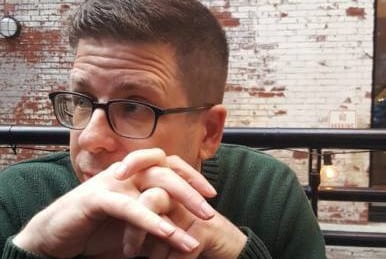The University of Washington Information School has named digital literacy expert Mike Caulfield as a research scientist who will lead the Center for an Informed Public’s rapid-response research program identifying, tracking and analyzing how mis- and disinformation takes root and spreads online during elections and crisis events.
Caulfield, previously the director of blended and networked learning at Washington State University Vancouver, starts in his new position at UW later this month.
In June, Craig Newmark Philanthropies gave the CIP $1 million in funding to support the CIP’s rapid-response research of mis- and disinformation, including during the upcoming 2022 U.S. midterm and 2024 U.S. presidential elections. In August, the National Science Foundation, through its Secure and Trustworthy Cyberspace Program, awarded a team led by CIP researchers, in partnership with Stanford University, a $3 million grant to study ways to apply collaborative, rapid-response research to mitigate online disinformation.
“Rapid-response research requires technical infrastructure and resources to support this vital work, but it also requires people,” said UW Human Centered Design & Engineering associate professor Kate Starbird, a CIP cofounder who now serves as the research center’s faculty director. “Mike has important experience and insights that will help our team predict and pre-bunk false narratives, detect and study mis- and disinformation as it occurs, and respond to it when appropriate.”
Caulfield has regularly collaborated with the CIP since its launch in December 2019 through his previous work at WSU Vancouver and as a UW iSchool affiliate instructor.
“Throughout my work with the CIP, I’ve always been impressed with the way its members balance the rigor of research with a commitment to public engagement and real-world solutions,” Caulfield said. “I’m beyond excited to be working with them on this initiative, where that balance is more important than ever.”
Caulfield has been a workshop facilitator for MisinfoDay, an annual misinformation awareness and educational event designed for high school students, teachers and librarians that is organized and co-hosted through a partnership between the CIP and WSU’s Edward R. Murrow College of Communication.
Caulfield was also a member of the CIP’s team working as part of the Election Integrity Partnership, a nonpartisan coalition of researchers that identified, tracked and responded to mis- and disinformation about voting during the 2020 U.S. elections. He was a major contributor to the EIP’s October 2020 “What to Expect on Election Night and Days After” analysis, which laid out anticipated mis- and disinformation narratives about voting and how uncertainty, anxiety, and potential red-to-blue and blue-to-red shifts in voting results due to when mail-in ballots would be counted in various states would create opportunities for domestic and foreign political actors, conspiracy theorists, and other opportunists to delegitimize the election results.
Caulfield has worked with various organizations on digital literacy initiatives to combat mis- and disinformation, including the American Association of State Colleges and Universities’ American Democracy Project, the National Writing Project, and CIVIX Canada. He is an awardee of the Rita Allen/RTI Misinformation Solutions Prize and the author of an award-winning textbook, Web Literacy for Student Fact-Checkers.
He developed the SIFT method for fact-checking (Stop, Investigate, Find better coverage and Trace claims) and related classroom instruction modules that have been used in more than a hundred universities and high schools in the U.S. and Canada.
“What is potentially revolutionary about SIFT is that it focuses on making quick judgments. A SIFT fact check can and should take just 30, 60, 90 seconds to evaluate a piece of content,” journalist Charlie Warzel wrote in a February New York Times feature on Caulfield’s work. “The four steps are based on the premise that you often make a better decision with less information than you do with more. Also, spending 15 minutes to determine a single fact in order to decipher a tweet or a piece of news coming from a source you’ve never seen before will often leave you more confused than you were before.”
Caulfield is currently working on two separate projects funded through the National Science Foundation’s Convergence Accelerator program. In one, he’s working as a co-principal investigator collaborating with researchers from the Massachusetts Institute of Technology’s Teaching Systems Lab and The University of North Carolina at Chapel Hill’s Center for Information, Technology and Public Life to build media literacy tools and resources based on SIFT and lateral reading, starting with examining the information-seeking concerns of rural populations.
The second, Caulfield is senior personnel on “Co-designing for Trust,” a project working with a team at the UW iSchool, The University of Texas Austin, Seattle Central College and Black Brilliance Research to reimagine ways to teach digital literacy and critical reasoning skills by developing locally and culturally relevant educational approaches for building more inclusive and trustworthy communications ecosystems.



